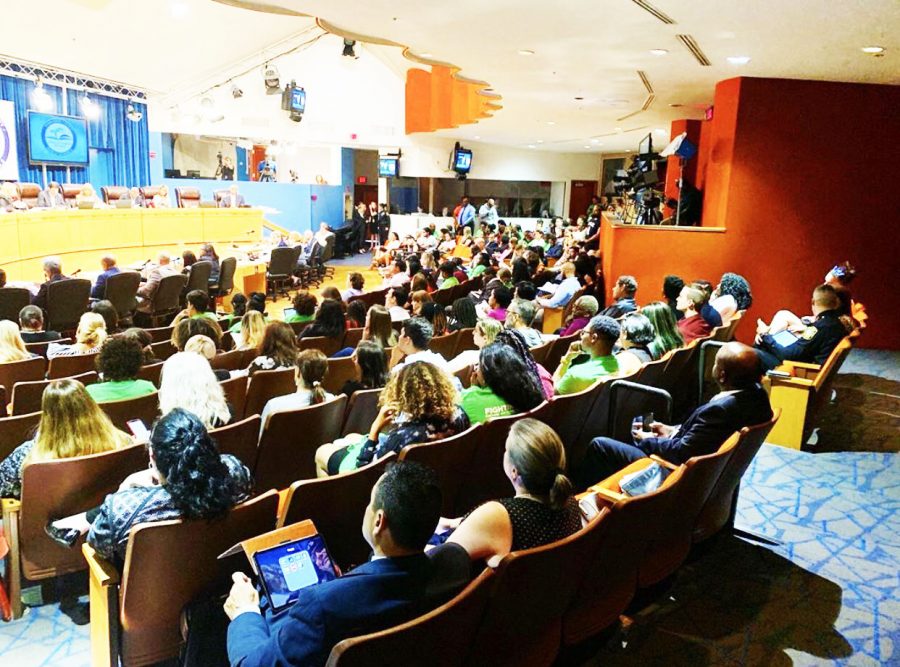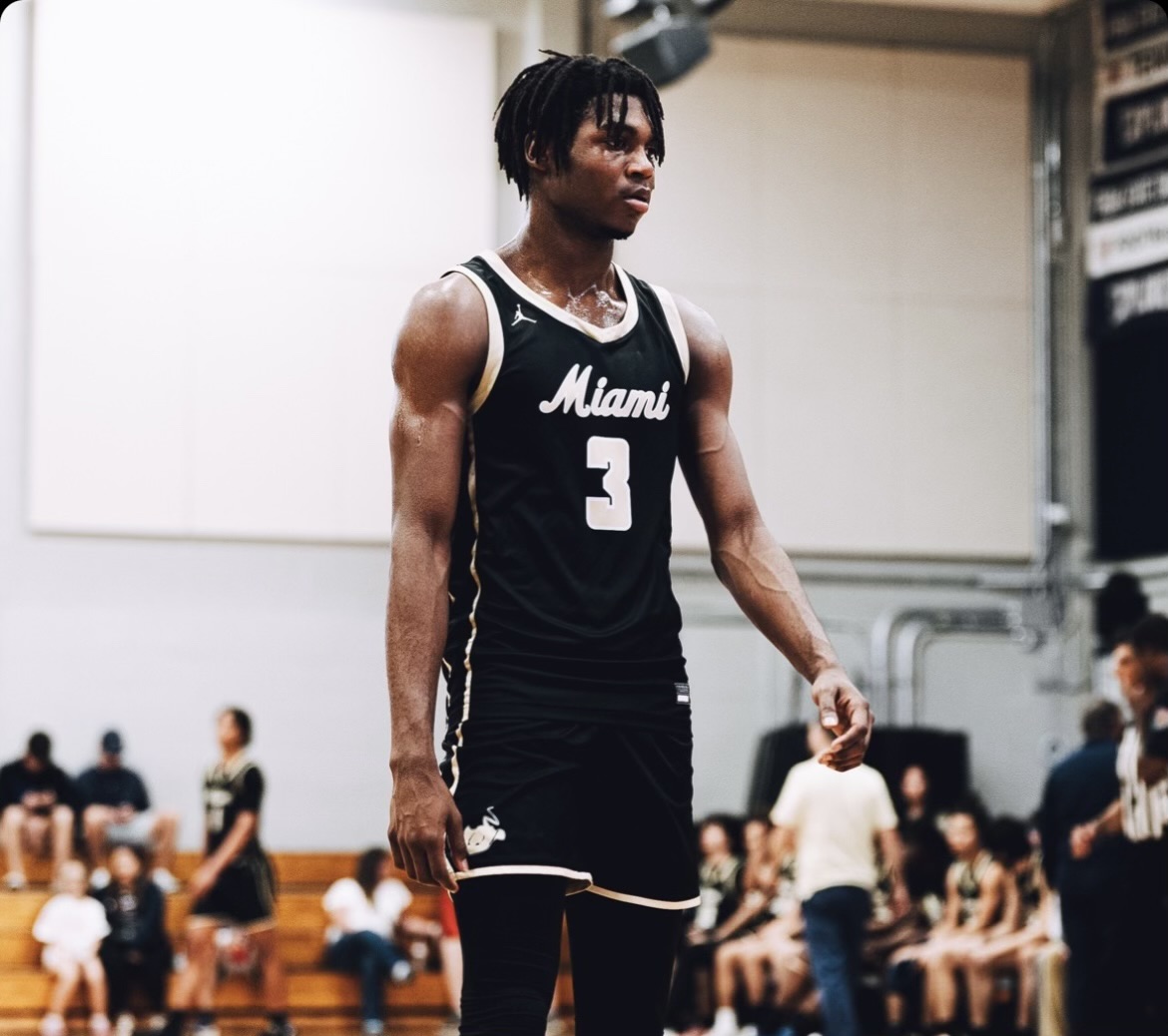Counselors Not Cops
Over 50 students, teachers, and community members attended the school board meeting on July 24th to raise questions about school resource officers being an effective method of keeping students safe in school.
October 21, 2019
After the unfortunate school shooting that took place in Parkland, FL on February 14, 2018, the focus on public and school safety was magnified throughout Florida. Some people feel that putting more police in schools was the answer, while others believe this is doing the exact opposite of keeping our students safe.
More cops or more counselors?
Power U Center for Social Change, a local youth-led community organization in Liberty City, has been advocating for the MDCPS School Board to increase funds in the annual school budget for more effective mental health resources and comprehensive sex education rather than the over-policing of our schools.
On July 24th, Power U attended the School Board’s first budget public hearing with over 50 students, teachers, and community members to testify against the addition of police in schools and raise questions about school resource officers (SROs) being an effective method of keeping students safe in schools.
According to data collected through Power U’s partnership with a team of researchers from the University of Miami and mental health experts, police and security personnel severely outnumber mental health counselors in schools. Alongside this, it’s found that suicide is the third leading cause of death in youth ages 10-24, and 50% of students aged 14 or older with mental illness drop out of high school.
Yet, the annual MDCPS school budget isn’t reflective of this. Rather than prioritizing these issues, many of which can lead to violence in the first place, approximately $50 million in the budget is being used to fund school police instead of highlighting the mental health crises affecting students across the country.
Conflicting points of view
Throughout the discussion of the annual budget, Superintendent Alberto Carvalho and organizers constantly disagreed on whether the facts presented by Power U at the meeting were accurate. It is important to note that Power U had met with MDCPS Chief Financial Officer Ron Steiger to overview the budget and ask clarifying questions regarding the process in general. Many Power U members saw the superintendent’s claim as a tactic to throw organizers and students off.
Power U community organizer Niki Franco said, “The Superintendent is being strategic around wording and semantics to try to discredit the truth the budget proves, and bureaucracy and lack of accountability amongst elected/appointed officials allows for this behavior.”
This became more complicated when addressing the roles of guidance counselors in schools. During the meeting, Superintendent Carvalho mentioned that Power U did not account for the amount of guidance counselors in schools in their data.
However, one organizer responded by saying that guidance counselors play more of a role in a student’s path to graduation rather than the student’s mental health.
Mr. Cuevas, Miami High’s 12th grade counselor, has also said that while guidance counselors are equipped to handle students in crises, “[Most counseling] goes around curriculum and what will help that student graduate.”
Current and former Stings speak out
Former and current students from Miami High also attended the school board meeting and provided testimonies on behalf of Power U. Johanna Mendoza, former student, said the meeting had a hostile environment. She said, “The school board members already seemed to have their own ideas as to what works in the school system and did not appear to care nor consider the input from the students within the same system they work for.”
Junior Ashley Ampie, who also attended, said the meeting was nerve-wracking because so many people showed up to speak, but the school board members seemed uninterested and kept leaving the room.
Senior Thais Maradiaga, who has attended two school board meetings this year, recalled, “The board members were visibly frustrated with the people giving their testimonies. They seemed more interested in dismissing us rather than listening.”
Call to Action
In the end, Power U elevated the voices of students and educators across school districts and encouraged students to have their own ideas about where these funds should be allocated. Sitting in nearly six-hour meetings and reaching out to school board members individually resulted in some successes, such as increasing the number of certified mental health professionals for MDCPS from 30 to 55, but it does not end there. There is still a long way to go before the school-to-prison pipeline is eradicated, and that begins with students stepping into their power like they did in front of the school board.
Consequences of over-policing schools
Students and faculty members at Miami High joined community organizers in feeling apprehension towards the amount of money going towards school policing. Junior Na’Keela Ludlow said, “We should have school officers, but they aren’t actively keeping students safe from other harm.”
Ms. Echevarria, the 10th grade guidance counselor, said, “When kids are dealing with a crisis, a school resource officer won’t be able to do anything. They don’t have that kind of training. The budget should have absolutely included more money for counselors.”
Niki Franco, an organizer with Power U, stated, “Both the state and district have doubled down on the resources allotted to policing and surveillance, which we know does not keep our children safe, but rather leaves them vulnerable to the school to prison pipeline.”
Power U’s Successes Since Meeting Over the Summer with the School Board
- Increasing Certified Mental Health Professionals from 30 to 55
- Nearly doubling the staff at the Department of Mental Health
- The Department of Mental Health is rolling out a “Community Advisory Committee” to monitor implementation.
Source: Niki Franco, Power U Community Organizer





